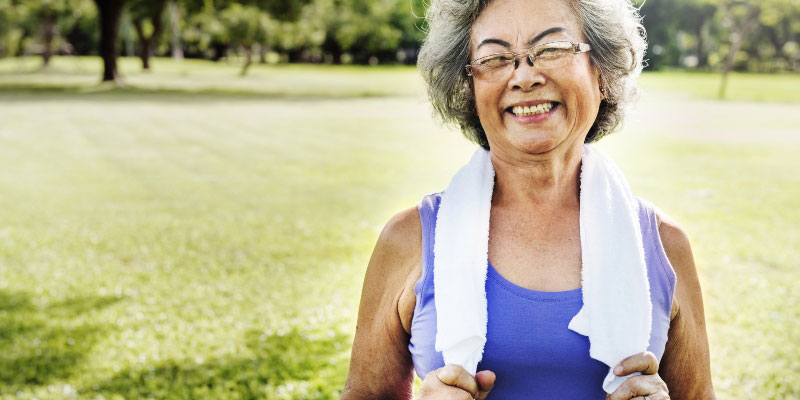Many seniors who reach retirement age start to slow down and decrease the time they spend exercising—or just stop exercising altogether after feeling fatigued from activities that at one point had been easy. However, doing so may have some serious consequences.
Choosing not to exercise as a senior can have a negative impact on your health. As you age, exercise becomes more than creating a healthy habit. Even simple exercises can give you significant benefits to your overall health—sometimes even more so than when you were younger.
1. Exercise Stops Muscle Loss
Muscle loss starts to affect all adults around age 30, with an estimated 5% loss of muscle in each subsequent decade. This process can speed up quickly around 65 years of age, which is why seniors can rapidly lose muscle mass and become enfeebled in a matter of a few years.
There’s no way to completely halt muscle loss, but exercises ranging from more intense weight-resistance training to simple daily exercise like walking and functional movements that use a wide range of muscle groups can slow the progress of muscle loss.
2. Exercise Improves Mental Health
Exercise is a huge stress reducer and releases hormones like endorphins that improve overall mental health and make you happy. A regular release of endorphins through exercise can significantly lower your risk of becoming depressed as you age. In addition, seniors who exercise have better moods and more self-confidence than seniors who don’t exercise.
3. Exercise Builds Stronger Bones
Falling and hurting yourself or breaking bones are some of the most devastating injuries that seniors can suffer from. Breaking a bone and losing bone strength creates long-lasting negative impacts on other areas of senior health. Exercise, usually in conjunction with good foods, can help build stronger bones that are able to withstand wear and tear without breaking.
4. Exercise Keeps Your Weight in Check
Metabolism and the ability to naturally burn calories slows down as you age, which is one of the main reasons why it’s difficult for seniors to lose or maintain a consistent weight as they grow older. Regular exercise can burn calories and speed up your metabolism which helps you control your weight.
5. Exercise Decreases the Risk of Falling
Damage from falls are some of the most debilitating injuries to seniors, as they both limit independence and can actually reduce life expectancy. A good exercise routine can improve flexibility, stamina, balance, coordination, and strength in seniors. All of these things combined can work together to reduce the risk of falling.
6. Exercise Helps You Sleep Better
Sleep is important as it gives seniors energy for their day and allows the mind to rest and maintain good health. Sleep is also an important factor in reducing senior depression and irritability while at the same time improving concentration and motivation.
Regular exercise can help you fall asleep quicker and stay asleep for longer—beating the insomnia that often keeps seniors from getting their recommended levels of sleep. Exercising can also help you feel more energized when you wake up after a good night’s sleep.
7. Exercise Prevents Disease
One of the most well-known benefits of exercise is that it helps to prevent a number of serious diseases that affect not only seniors, but adults of every age. This can include heart-related diseases like high-blood pressure and heart attacks, along with other diseases like diabetes and osteoporosis.
Exercise also has been shown to improve immune health—as people who exercise regularly get sick less often than people who don’t exercise at all—along with digestive and gut health.
8. Exercise Reduces the Risk of Memory Disease
Exercise and physical activity has been shown to reduce the chances of coming down with serious memory diseases like Alzheimer’s disease and other forms of dementia. Exercises that include multiple parts or are more detail-oriented can improve cognitive functions by working areas of the brain that might not otherwise be stimulated.
9. Exercise Encourages Socialization
Most senior exercise ends up becoming a group activity, especially for seniors who are exercising in the same senior living community. This leads to increased odds of having more social engagements and opportunities to make friends and cultivate relationships.
Even if you exercise alone, the added energy gained from a daily exercise routine can help you feel motivated to socialize rather than isolating yourself. Seniors who live more sedentary lives might not be as willing to get up and leave the comfort of home, despite the benefits of socialization.
Not all exercise needs to be intense in order to have a large impact on senior health. Even simple chair exercises, stretches, or short walks can make major long-term improvements to overall senior health. Understanding what your limits are and finding exercises that fit your lifestyle can help you improve your health, both physically and mentally for years to come.





